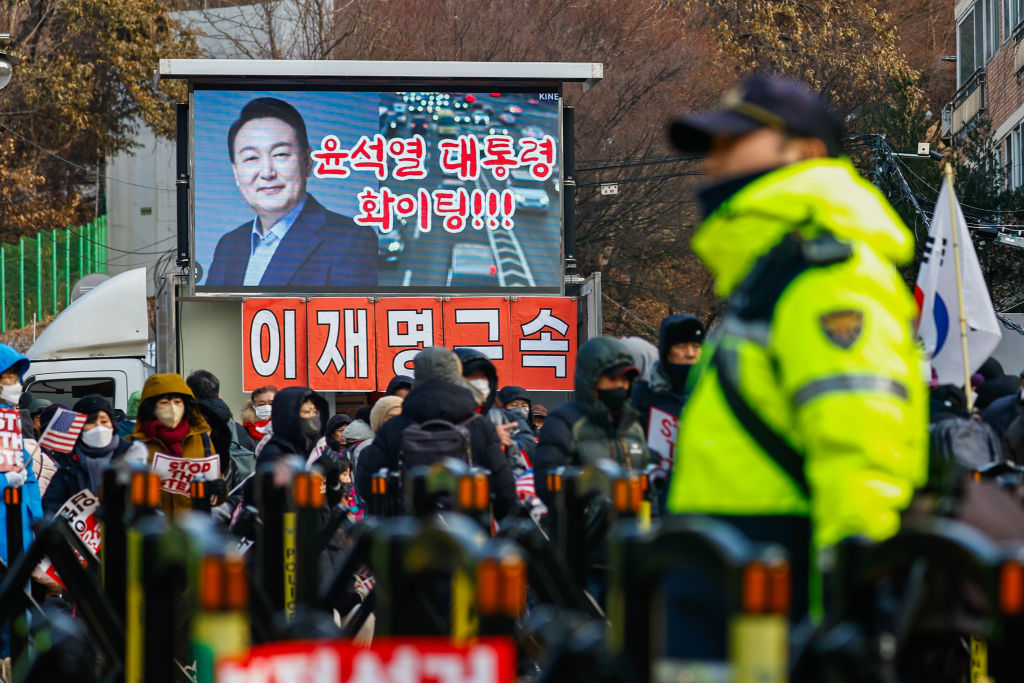Impeached South Korean President Yoon Suk Yeol was arrested and questioned by authorities on Wednesday in relation to a criminal insurrection investigation, saying he was only cooperating with what he called an illegal probe to avoid violence.
His arrest, the first ever for an incumbent South Korean president, is the latest head-spinning development for one of Asia’s most vibrant democracies even though the country has a history of prosecuting and imprisoning former leaders.
Since lawmakers voted to impeach him and remove him from duties after his short-lived Dec. 3 declaration of martial law, Yoon has been holed up at his hillside residence, guarded by a small army of presidential security that blocked a previous arrest attempt.
He agreed to come in for questioning after more than 3,000 police officers determined to arrest him marched on his residence in the early hours of Wednesday.
“I decided to respond to the CIO’s investigation – despite it being an illegal investigation – to prevent unsavoury bloodshed,” Yoon said in a statement, referring to the Corruption Investigation Office for High-ranking Officials (CIO) that is heading the criminal probe.
A prosecutor accompanied Yoon in his car from his home in the upscale area known as Seoul’s Beverly Hills to the austere CIO offices, where he slipped in through a back entrance, avoiding media.
Authorities now have 48 hours to question Yoon after which they must seek a warrant to detain him for up to 20 days or release him.
However, Yoon is refusing to talk and has not agreed to have interviews with investigators recorded on video, a CIO official said. The CIO said it had no information on why Yoon was refusing to talk.
The questioning will continue after Yoon finishes a dinner of bean paste soup, the CIO official said, though late night questioning has not been decided.
Yoon’s lawyers have said the arrest warrant is illegal because it was issued by a court in the wrong jurisdiction and the team set up to investigate him had no legal mandate to do so. A warrant to search Yoon at his residence, a copy of which was seen by Reuters, referred to Yoon as “ringleader of insurrection”.
Presidential guards were stationed on the CIO floor where Yoon is being questioned, said a CIO official, but he will likely be held at Seoul Detention Centre, where other high-profile figures including former President Park Geun-hye and Samsung Electronics Chairman Jay Y. Lee have also spent time.
SERIOUS INTEREST
Yoon’s declaration of martial law shocked South Koreans, rattled Asia’s fourth largest economy and ushered in an unprecedented period of political turmoil in one of Washington’s key security partners in the region. Lawmakers voted to impeach him shortly on Dec. 14.
Separate to the criminal investigation, the Constitutional Court is deliberating whether to uphold his impeachment by parliament and permanently remove him from office or restore his presidential powers.
The United States remains committed to working with the government in Seoul and appreciates all its efforts and citizens “to act in accordance with the Constitution”, a spokesperson for the White House National Security Council said in statement.
The top government spokesperson in neighbouring Japan, Yoshimasa Hayashi, told a daily news briefing that Tokyo was following developments in South Korea “with particular and serious interest”.
The latest arrest attempt that began before dawn gripped the nation with hundreds of thousands glued to live feeds showing bus loads of police arriving near the presidential residence, pushing past Yoon supporters and then walking towards the gates of the compound carrying ladders and wire cutters.
As local news broadcasters reported that Yoon’s detention was imminent, some minor scuffles broke out between pro-Yoon protesters and police near the residence, according to a Reuters witness at the scene.
Throngs of protesters, who also gathered outside the CIO offices, waved South Korean and American flags and held posters bearing “Stop the Steal” slogans referring to Yoon’s unsubstantiated claims of election fraud – one of the reasons he gave to justify his short-lived martial law declaration.
CALLED FOOLISH
In a hand-written letter posted to his Facebook page, Yoon said he was often called foolish because he did not compromise.
He claimed there was too much evidence of election fraud for it to be dismissed as a conspiracy theory, even while acknowledging “there is insufficient evidence to punish a specific person for it”.
The National Election Commission, which was one of the targets of troops deployed by Yoon during the martial law, has denied allegations of election fraud, saying the election system is transparent and above board with plenty of oversight.
Some of Yoon’s supporters have drawn parallels with his plight and that of U.S. President-elect Donald Trump, who also claimed voter fraud contributed to his election defeat in 2020 but recovered to make a stunning political comeback.
“It is very sad to see our country falling apart,” said Kim Woo-sub, a 70-year-old retiree protesting against Yoon’s arrest outside his residence on Wednesday.
“I still have high expectations for Trump to support our president. Election fraud is something they have in common but also the U.S. needs South Korea to fight China,” he said.
Despite polls showing a majority of South Koreans disapprove of Yoon’s martial law declaration and support his impeachment, the political standoff has given oxygen to his supporters and his People Power Party (PPP) has seen a revival in recent weeks.
Support for the PPP stood at 40.8% in the latest Realmeter poll released on Monday, while the main opposition Democratic Party’s support stood at 42.2%, within a margin of error and down from a gap of 10.8% from last week, the poll said.
(Reuters)














